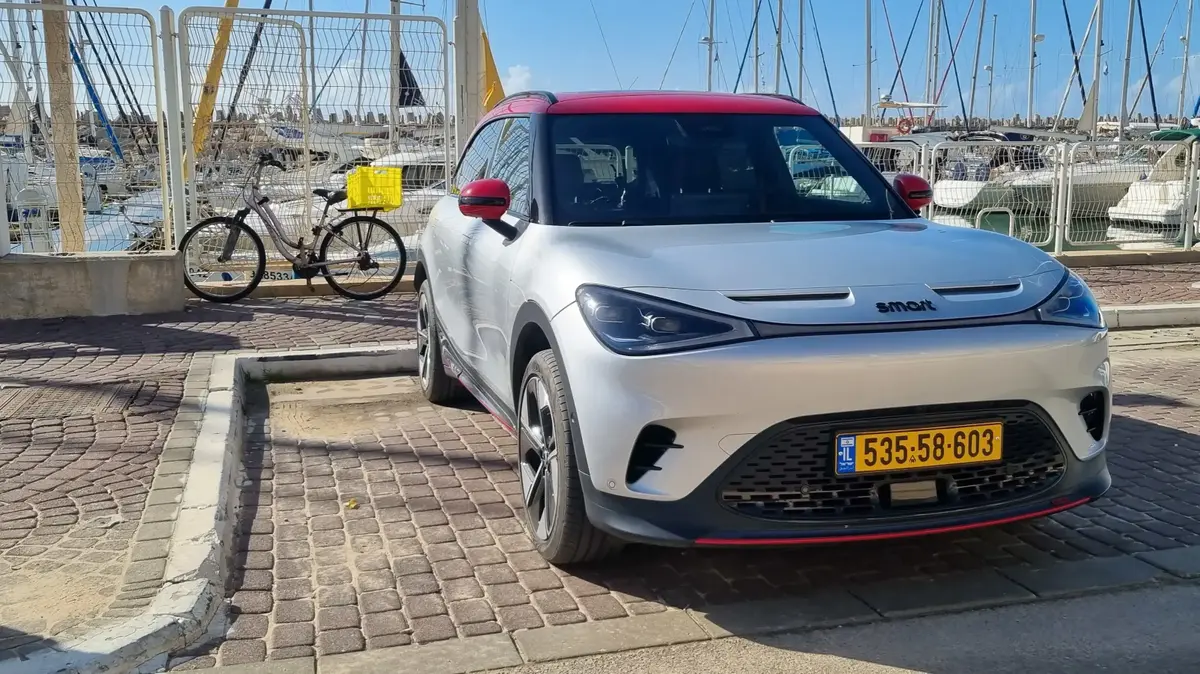vehicle
Car News
Combina's death?
End of the biennial test initiative
Among the many tasks to perform for the new Minister of Transportation, there is also a list of tasks that are very worth deleting with a thick black marker - the transition to a biennial test deserves to be the first of them.
Tags
test
car test
Licensing test
Tests
Licensing Centre
Department of Transportation
Keenan Cohen
Sunday, 13 June 2021, 08:30 Updated: 08:45
Share on Facebook
Share on WhatsApp
Share on general
Share on general
Share on Twitter
Share on Email
0 comments
Believe in coincidences? Here is a very interesting one. On March 23, 2020, the Israeli organization for car rental and leasing in the Association of Chambers of Commerce addresses the then Minister of Transportation, Bezalel Smutrich. Their request: an examination of the comparison of the date of the first aptitude test for leasing cars with that of a privately owned car - that is, three years after the ascent to the road instead of two years today. In an extraordinary and not at all suspicious coincidence, at the same time the Ministry of Transportation's Automotive Division was asked to examine the transition to a biennial licensing test for cars from the 2018 production year for their first ten years (an old initiative that suddenly came to life).
And to simplify the meaning: if the first move is approved, the leasing company will be able to exempt itself from the logistics and associated costs of conducting a licensing test for its tens of thousands of vehicles, including the associated costs in case repairs are needed, or at least postpone it for a year.
If the second change is accepted, the companies will also be able to save the expense on an additional licensing test at the end of the leasing period of three years on average before the car is sold to the private customer.
More on Walla!
Safety experts against the Ministry of Transportation's initiative for a two-year test: "May cost human lives"
To the full article
The committee set up by the Ministry of Transportation rightly recommended rejecting the application of leasing companies, relying on the fact that the nature of the use of leasing and rental cars produces a substantial difference between them and private cars.
Their mileage is significantly higher and stands at 28-29 thousand km per year compared to 16-17 thousand km in a privately owned car.
As well as the fact that these cars have defects at a higher rate than private vehicles.
Gaps in annual travel and the prevalence of defects in leasing and rental cars (Photo: Manufacturer)
But as for the second part, that of passing the licensing test once every two years, here there is already an opportunity for a round on public opinion. The news as circulated on December 8 last year was, as is the way of pompous news - very solemn "soon: 'Test' every two years for vehicles aged three to ten years" and of course the promise to save the public time, money and unnecessary hassle. Behind the big words, on the other hand, was a completely different reality.
Firstly regarding the promise to save time, if you accept the Ministry of Transport's approach that the percentage of defects of a car up to the age of 10 is low, then the annual licensing test should not take more than 15 minutes and even if we add the gross time - an annual time the citizen devotes to the process. Completely marginal. As for the financial matter, the Ministry of Transportation does not exempt the payment of the very high fee and ranges from a little more than NIS 1,000, according to three of them in expensive cars, but only the NIS 96 to the licensing institute itself. There, gentlemen, is not the big money.
Data from the "Technotest" network prove the gap in safety deficiencies (Photo: Keinan Cohen)
"About NIS 6 billion goes into the state coffers every year from the licensing fees for cars," says Shabi Bracha, president of the Technotest Group. "Take half of that and invest in improving infrastructure, winter inspections and if there is a surplus - even summer inspections" and it should be said - licensing institutes, probably large chains Like Technotest they are the first to suffer financially from the change in question and their standing on their hind legs is also due to economic reasons, but not only that.
Because Bracha knows how to back things up with numbers, "we have data on vehicle percentage of defects and those defects that necessarily lead to accidents" and as proof he attaches pictures of two- or three-year-old vehicles arriving at licensing institutes with tire defects, steering and braking systems, without the examining eye of Licensing institutes would continue to roll on the roads.
More on Walla!
Safety defects were found in every second vehicle inspected
To the full article
"The usual procedure for car manufacturers is to replace the brake fluid once every two years or 30,000 km, brake oil that absorbs moisture or water and lowers the braking quality to the point of losing the brakes - and the Ministry of Transport will simply ignore it.
He ignores the instructions of his own procedure ", another example he gives concerns tires" they hold between 30 and 45 thousand km, Chinese tires are not much better quality, there are vehicles that do 40 thousand km and that is where they are looking to save Everywhere "a third point he raises is the issue of recalls (initiated calls for repair) made by automakers - licensing institutes, such as Technotest, with its linked information systems, with detailed documentation and testing procedures, as the executive arm of the Ministry of Transport are the last line of defense against Continued rolling of vehicles with such defects on the road.
Safety defects in 40 percent of vehicles that fail the licensing test (Photo: Keinan Cohen)
But ostensibly, I tell him, vehicles that are regularly serviced in the garage - will not reach this poor maintenance conditions, there are European countries where the frequency of licensing tests is not once a year, an argument on which the Ministry of Transport relies in the reasoning for its decision.
Shabi sighs and leans back "Infrastructure in the country is a huge gap from that of Europe, the comparison itself is incorrect. Can you compare the streets of Berlin and Stockholm to Clanswa? Or the condition of the side roads in the Netherlands to those of the Galilee? In cars. "
"We meet two-year-old cars with tire wear, steering systems, mirrors, wipers, with poor lighting - how many tens of shekels for the licensing institute is the big savings we are promised? We'll see them take it off the fee paid to the state."
A vehicle with safety defects in the worst case will get stuck on the side of the road, in the worst case it will be involved in an accident (Photo: Keinan Cohen)
And the data from the chain's 15 branches continues to pile up on the table, including the alarming figure of safety deficiencies on the order of about 40 percent of vehicles that fail the annual licensing test, "Such a vehicle at best gets stuck on the side of the road and endangers its driver in injuries, at worst - He loses control of the car and causes an accident. "
Currently, these provisions of the procedure are not being implemented, the original date of May 22 has passed and at least according to the state of affairs now there is no intention to return to this original plan. Opposition to this move also comes from the Green Light Association, CEO of the Green Light Association, Erez Kita, estimates that "the decision to extend the time the state checks the condition of vehicles from two to two years is dangerous, and may even create a situation where real ticking bombs will travel on the road next to us. He said, "The reality is that every second vehicle gets on the road when it is not working properly, some of them even drive with serious and dangerous safety deficiencies."
Will not save time and we may pay dearly for the money (Photo: Kobi Liani)
However, from the point of view of licensing institutes, this is an opportunity to raise for discussion or at least for public awareness the gap that exists between the current situation and the ways to improve it.
From the three counter-opinions submitted by the licensing institutes to the Ministry of Transportation, some of which were compiled by safety expert Dr. Moshe Becker (who estimated the potential for 20-80 deaths per year) and veteran automotive engineer Shmuel Ben-Ari and economists in the field. Another of this problematic, but one that also tells the bigger story of the rotten conduct that accompanied the process.
More than 1,000 died as a result of vehicle air pollution, but the Ministry of the Environment was not involved in the change of initiative (Photo: Walla! NEWS system, Reuven Castro)
Every year, about 2,500 people die in Israel as a result of air pollution, half of which the Ministry of the Environment attributes to emissions from motor vehicles. Even if a vehicle is well maintained in terms of its steering and braking systems as part of its routine maintenance - licensing institutes are currently the only tool to control pollutant emissions (this is due to the fact that the Ministry of Transportation's safety vehicles are old, worn and not equipped with appropriate equipment). But the Ministry of the Environment is excluded from the whole process of examining the change in the frequency of the annual tests. "Walla! Vehicle" stated that: "The Ministry of Environmental Protection is not an initiating partner to change the installation. We are in contact with the Ministry of Transportation to learn about the change they intend to make, and to formulate our position on the issue accordingly. "
"These 'facilitations' of the Ministry of Transportation can cost us all dearly," concludes Bracha. "It's like the army saying why do a weekly tank treatment or clean the weapon every time. It will be easy for everyone if we give it up - but it's a reality we must not accept."
Share on Facebook
Share on WhatsApp
Share on general
Share on general
Share on Twitter
Share on Email
0 comments















